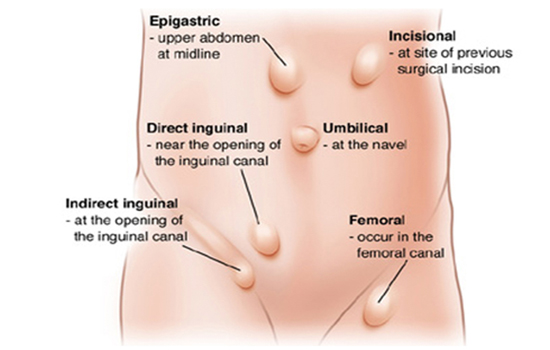Best Hernia Surgeon in Delhi
What exactly is Hernia?
A hernia occurs when an organ pushes through an opening in the muscle or tissue that holds it in place. Many hernias occur in the abdomen between your chest and hips, but they can also appear in the upper thigh and groin areas. The most common forms of hernia are Inguinal Hernia, Femoral Hernia, Umbilical Hernia & Hiatal Hernia. Dr. Sukhvinder Singh Saggu is the best laparoscopic hernia surgeon in Delhi NCR.

How is Hernia is treated?
Hernias are repaired through open surgery or laparoscopically. The technique used is based on several variables, like the size and location of the hernia, the patient’s age, and overall health.
Types Of Hernia Surgery
- Open inguinal hernia repair in which a cut is made into the body at the location of the hernia. The protruding tissue is set back in place and the weakened muscle wall is stitched back together. Sometimes a type of mesh is implanted in the area to provide extra support.
- Laparoscopic inguinal hernia repair surgery involves the same type of repairs. However, instead of a cut to the outside of the abdomen or groin, tiny incisions are made to allow for the insertion of surgical tools to complete the procedure.
- Robotic Hernia Repair surgery like laparoscopic surgery uses a laparoscope and is performed with small incisions. With robotic surgery, the surgeon is seated at a console in the operating room and handles the surgical instruments from the console. While robotic surgery can be used for some smaller hernias or weak areas, it can now also be used to reconstruct the abdominal wall.
Advantages of Hernia Surgery
Most hernias will not get better without surgery. Hernia surgery is safe and effective for most people. Repairing a hernia have following benefits.
- Remove any bulge or lump.
- Prevent complications. In rare cases, part of the intestine can become trapped in the weak area of the abdominal wall. This can cut off the blood supply (strangulated hernia). It can also cause bowel blockage. Both situations are medical emergencies. Repairing the hernia will prevent this from happening.
- Help reduce discomfort.
Risks and potential side effects
- Bleeding
- Seroma (fluid collection under the surgical site)
- Infection, potentially of the surgical site or the surgical mesh used for repair
- Postoperative pain
- Bowel or urination issues (e.g., constipation or difficulty urinating)
- Nerve or tissue (e.g., bowel) injury or damage
- Hernia recurrence
Get a consultation with the best laparoscopic hernia surgeon in Delhi NCR Dr. Sukhvinder Singh Saggu.
Frequently Asked Questions
- Can you live normally after hernia surgery?
Ans. Yes, patients recover well and lead healthy life after hernia surgery. One must walk and perform light stretching a week after the surgery. It takes 4 to 6 weeks to fully recover following prescribed medications, rest, dietary and lifestyle changes. Avoid heavy lifting and strenuous activities as far as possible to avoid post-operative complications.
- How long is recovery from hernia surgery?
Ans. After a successful hernia surgery, one can return to work within 1 to 2 weeks of rest. One may need to take 4 to 6 weeks off from work if it involves heavy lifting or strenuous activity. Lifestyle and dietary modifications help in a smooth and seamless recovery after the surgery.
- What are the side effects after hernia surgery?
Ans. Often side effects are seen in patients suffering from hernia mesh, i.e., pain and discomfort near the abdomen, stomach, leg, groin, or testicles. Some may complain of a “stiff” feeling in the gut. Sometimes, bruising and swelling may accompany these symptoms.
- What foods to avoid after hernia surgery?
Ans. Eating large meals puts sudden pressure on the stomach, increasing hernia pain. Avoid citrus, fried foods, and high-fat/ high-caloric foods with low nutritional value. A small meal in regular intervals should be taken, maintaining adequate hydration levels. Do not consume alcoholic or carbonated beverages.
- Which is better, open or laparoscopic hernia repair?
Ans. Laparoscopic hernia repair involves a lower risk of infection, less post-operative pain, and a quicker recovery. One can return to work or normal activities within 7 to 10 days. Laparoscopic hernia repair is most suitable for patients suffering from abdominal hernias (on both sides) or recurrent inguinal hernias.
